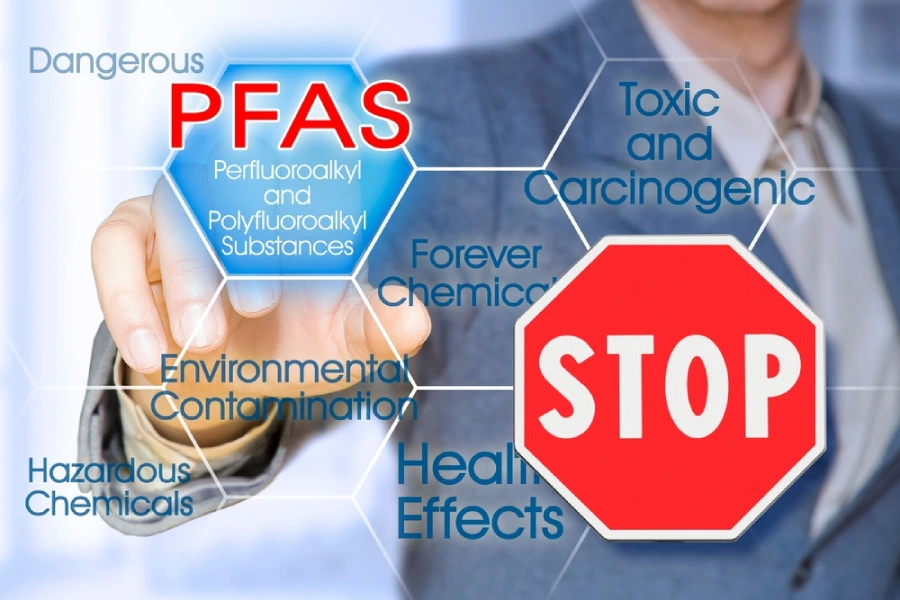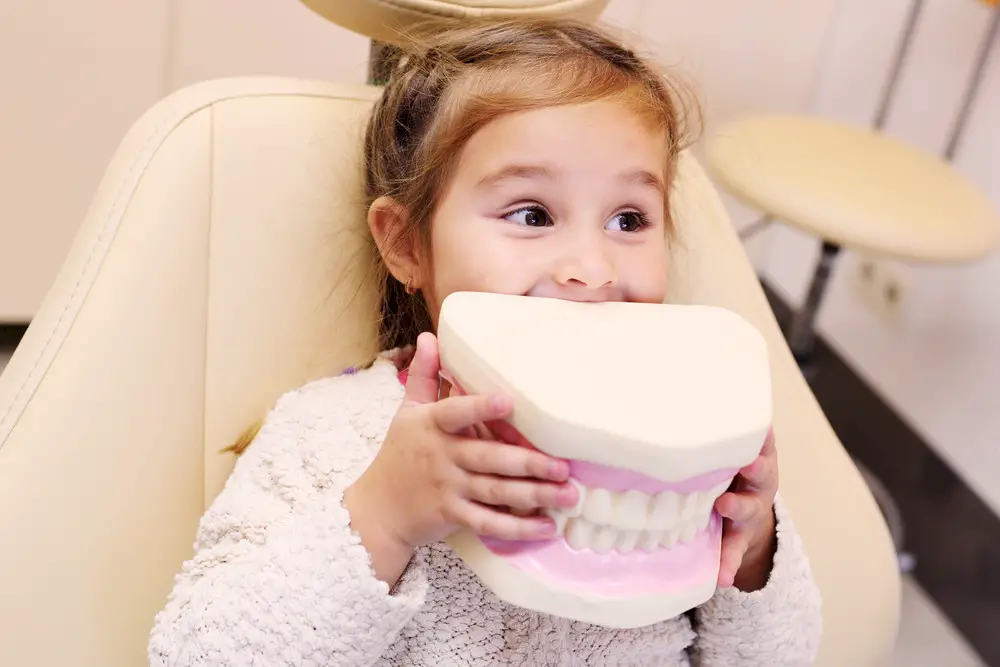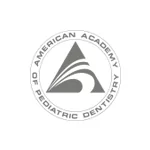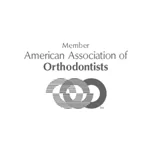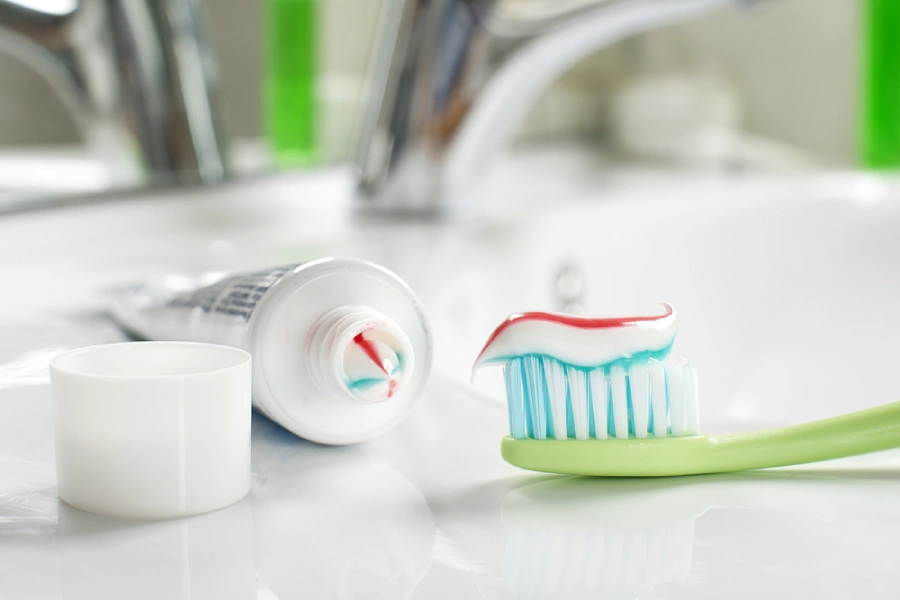
Blog Summary:
- The fluoride vs non-fluoride toothpaste debate has overshadowed more serious ingredient concerns.
- Fluoride, when used properly, is a safe and effective cavity-fighting mineral.
- Non-fluoride toothpastes may still contain harmful ingredients like triclosan, peppermint oil, and charcoal.
- Common ingredients like PTFE (Teflon) and titanium dioxide carry serious health risks.
- Many oral care products disrupt the oral microbiome, impacting digestion, immunity, and heart health.
- The mouth is a living ecosystem; proper care supports whole-body wellness.
- Choose products that remineralize enamel, are microbiome-friendly, and age-appropriate.
- SuperMouth offers dentist-approved, science-backed oral care with or without fluoride.
- All SuperMouth products feature Hydroxamin®: nano-hydroxyapatite + D3 & K2 for safe remineralization.
When it comes to toothpaste and other mouthcare products containing fluoride, there’s a lot of debate amongst the general population about which option is best. But truthfully, as the fluoride vs. non-fluoride debate has played out over the past several decades, toothpaste manufacturers and big box brands you may know well – and trust – have been filling their products with ingredients far more dangerous than fluoride, including everything from titanium dioxide to PFAS. Let’s dig up what’s been hiding in plain sight so you can make more informed decisions about your oral care and overall health.
The Truth About Fluoride: What it Does & Doesn’t Do
You may have heard things about fluoride being toxic. Truthfully, while fluoride can lead to a rare condition called dental fluorosis if used in excess or used improperly, fluoride is generally considered to be a safe and effective anticavity agent – an assertion backed by over 70 years of scientific research.
Did You Know? Fluoride is found naturally in foods you probably eat every day, including many vegetables, teas, and types of seafood. Before the baby teeth even erupt, fluoride taken in from foods and beverages helps create strong enamel. And, after eruption, fluoride helps rebuild (or “remineralize”) enamel by creating fluorapatite, which is up to ten times more acid-resistant than natural enamel!
In other words, when used properly in small doses, fluoride toothpaste offers fantastic protection against cavities, especially in kids and teens who are still building healthy oral care habits. But it should never be ingested.
That means, for little ones who may accidentally swallow their toothpaste, fluoride is generally not recommended.
What’s the verdict? While fluoride is hardly the villain it’s pictured to be, it’s also not a cure-all…which warrants a discussion of non-fluoride toothpaste.
Non-Fluoride Toothpaste: Cleaner or Just Unclear?
If you were to believe all the clever marketing you read, you might be led to think that “non-fluoride” equates to “guaranteed safe for use”. But that is simply not true. Choosing a non-fluoride toothpaste only tells you what isn’t in your tube of toothpaste – not what is inside.
Many non-fluoride toothpastes on the market are touted as “natural” or “clean,” but they still include ingredients that could be harmful for your teeth, including harsh ingredients like charcoal and peppermint oil.
This is also the problem with fluoride toothpaste, as it so happens. That is, knowing that a toothpaste does contain fluoride doesn’t necessarily clue you into what else is in it.
Did You Know? Many flosses also contain PTFE (Teflon), a class of “forever chemicals” that’s known to be associated with increased risks of cancer.
What’s Really in Your Toothpaste?
We’ve now established that comparing non-fluoride toothpaste vs fluoride toothpaste isn’t the only thing you should be doing to safeguard your health. You should also be looking at the toothpaste ingredients holistically.
But what ingredients, specifically, should you avoid? According to the EWG, which ranks ingredients by their relative toxicity, with scores of 1 being the safest and 10 being the most toxic, there are many toothpaste and oral care ingredients that you should avoid for a number of good reasons, ranging from genotoxicity concerns to oral microbiome disruption.
| Ingredient | Use | EWG Score | Risks |
| Fluoride | Enamel Protection | 2 | Overexposure>Fluorosis |
| Titanium Dioxide | Whitening Agent | 3 | Genotoxicity Concerns |
| Peppermint Oil | Flavoring | 4 | Microbiome Disruption & Respiratory Issues in Kids |
| Triclosan (Banned in Some Countries) | Antibacterial | 7-8 | Hormone Disruption |
| PTFE (Teflon) | Found in Floss | 10 | “Forever Chemicals”: Immune/Hormonal Risks |
Your Mouth is an Ecosystem
It’s easy to understand why you should avoid toxic chemicals like PTFE and Titanium Dioxide. But peppermint oil? (You might be thinking, Really?! Come on!).
Here’s the rub – to truly understand why it’s important to stay away from ingredients like peppermint oil or alcohol, you have to realize that the mouth is an ecosystem and maintaining the delicate balance of good to bad bacteria in your mouth helps support not just your oral health but also your immune system and overall health. More than that,
- Your teeth are alive and need minerals like calcium and phosphorus
- Your gums are a gateway to your bloodstream
- Your oral microbiome plays a role in everything from digestion the heart health
So it’s important to look for products that are not only free of dangerous chemicals but also pH-balanced.
Failure to do so can result in everything from bad breath to increased risk of gum disease and digestive challenges (among other things).
Is Your Toothpaste Whole-Mouth Friendly?
Asking about fluoride vs non-fluoride toothpaste is a step in the right direction when it comes to taking care of your oral health and overall health. But it’s not perhaps the most effective question you could be asking. Instead, when choosing toothpaste, mouthwash, floss, and other mouthcare products, you should be asking: “Is this product whole mouth friendly?”. You should seek out products that:
- Remineralize enamel
- Support beneficial oral bacteria
- Avoid harsh, toxic, or drying ingredients
- Fit your age and cavity risk level
Experience Mouthcare in a Whole New Way
Looking for a toothpaste (or floss, or mouthwash for that matter) that’s formulated to help prevent cavities, rebuild enamel, AND support whole mouth health?
Look no further than SuperMouth. Formulated with OR without fluoride and with Hydroxamin – a proprietary blend of hydroxyapatite (another powerful remineralizing agent) plus vitamins D3 and K2 for calcium absorption, all SuperMouth products are safe, effective, and dentist-approved.


